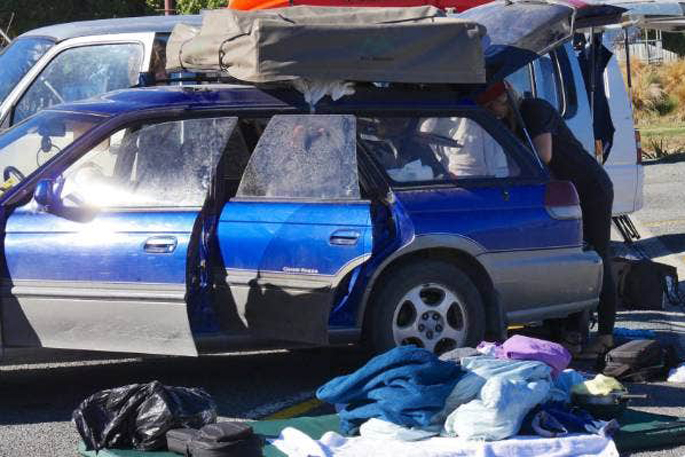More than 245,000 freedom campers hit New Zealand's scenic spots last year, some of them touring the country for months at a time.
Well-behaved campers spread their cash through the regions and left just footprints.
The feral few pooed in the bushes, littered, washed their dishes, clothes and bodies in streams and public drinking fountains, and spent as little as $37 a day.
Continued border closures will greatly reduce foreign freedom camper numbers this summer, putting the behaviour of Kiwi campers under the spotlight.
Research commissioned by the Ministry of Business, Innovation and Employment estimated 154,000 overseas visitors and 91,000 New Zealanders spent 2.6 million nights freedom camping in 2019.
The data was drawn from the CamperMate app, cameras monitoring a dozen free camping sites, and an online survey of 7328 campers (505 of them international tourists).
Freedom camping was evenly divided between the North and South Islands for overseas visitors, while about two thirds of domestic freedom camping occurred in the North Island.
The three most popular freedom camping areas in the country were Tasman, Queenstown Lakes and Christchurch city.
There were also marked differences in camper behaviour and spending patterns.
Kiwi freedom campers
The average age of domestic freedom campers was 63, and close to 90 per cent were over 50.
Most had certified self-contained vehicles with built-in toilets and showers.
The average length of their last trip was 17 nights, a week of which was freedom camping, and they spent on average $43 per day on fuel and food.
They favoured designated freedom camping sites and New Zealand Motor Caravan Association Parks, with just 15 per cent of their stays in commercial campgrounds.
However, the demographics are changing because a growing number of young families are buying or renting campervans going cheap as a result of Covid-19.
Last week TradeMe reported more than 86,000 searches for caravans and campervans, and in September the site recorded an 18 per cent increase in sales of those vehicles compared with the same period last year.
International freedom campers
Overseas visitors sitting out the pandemic in New Zealand continue to freedom camp, and although their numbers are much lower, that will change once border restrictions are lifted.
Holiday Parks Association chief executive Fergus Brown says the research findings show we need to take a hard look at future management of freedom camping.
Pre-COVID-19, it was particularly popular with younger visitors from the UK and Europe whose prime motivation was saving money on accommodation.
Those in their twenties were more inclined to buy their own vans, cars or campervans.
On average, they freedom camped for just over half the 211 nights they stayed in New Zealand, and they spent $37 per day.
That was less than half the amount spent by freedom campers travelling in rentals (once hire costs were excluded).
The latter groups also freedom camped for much shorter periods (20 nights in budget rental vehicles and 11 nights in premium vehicles).
When it came to attractions and activities, domestic and overseas vehicle owners spent $3 a day on average, compared with $11 and $16 spent by budget and premium hirers.
Fergus says it is completely unsustainable to continue hosting thousands of overseas visitors travelling in old un-selfcontained vehicles to see New Zealand on the cheap.
'They're staying seven months for Pete's sake and spending $37 a day. When you total it up it sounds a lot of money, but when you divide it by seven months it's very little, people would be shocked.”
Where to now?
A survey of more than 4200 domestic visitors showed 43 per cent thought freedom camping had a positive impact on the economy, but more than half wanted tighter controls and 10 per cent wanted it banned altogether.
Researchers also interviewed Department of Conservation rangers and council staff in key freedom camping areas.
They suggested raising self-containment standards, making hire companies more responsible for the behaviour of their customers (including recovery of fines), and the introduction of consistent easily understood rules across the country.
Loss of access to public spaces and a negative impact on local businesses, particularly commercial campgrounds, were commonly cited as reasons for a public backlash that at times saw residents verbally abusing campers.
Over the past three years the Government has poured more than $24m into improving freedom camping facilities but those efforts have not always had the desired outcome.
Fergus is adamant that despite the financial hit from freedom camping, commercial campgrounds are not seeking to ban it altogether.
'We just want to make sure it's in the right vehicle in the right places.”



3 comments
Campervanners
Posted on 19-10-2020 18:59 | By raewynf
I just hope we as kiwis don’t mess the country up
Campers
Posted on 19-10-2020 19:01 | By raewynf
Keep it tidy please
campers
Posted on 20-10-2020 10:06 | By dumbkof2
to be fully self contained showers and toilets must be permantely fixed in the vehicle. not just a tin can on the floor.only fully self contained vehicles allowed to freedom camp
Leave a Comment
You must be logged in to make a comment.